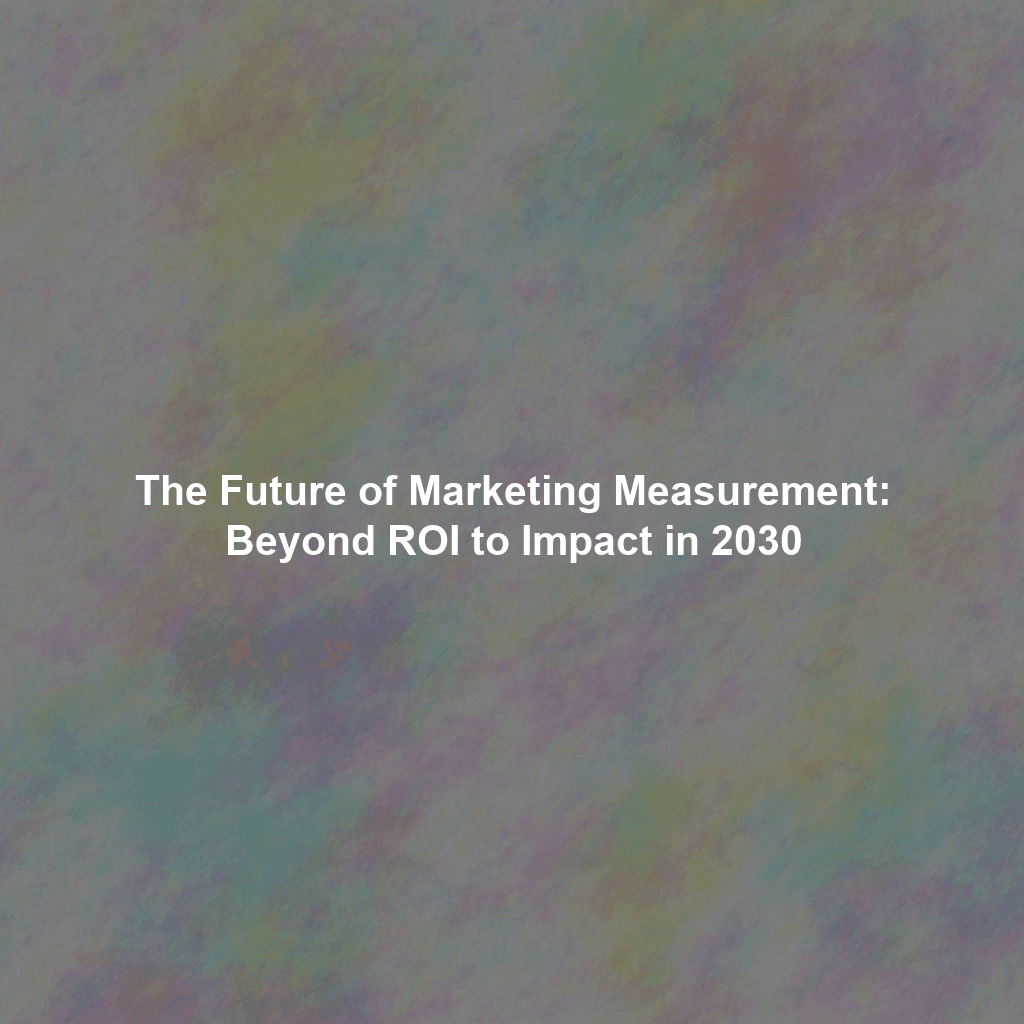The year is 2030. Marketing has evolved beyond recognition. The days of solely chasing Return on Investment (ROI) are long gone. In this new era, success hinges on understanding and quantifying the impact of marketing initiatives on brand reputation, unwavering customer loyalty, and a demonstrable commitment to social responsibility. This isn’t just a shift in metrics; it’s a fundamental change in how we perceive and value marketing’s contribution to business success. Welcome to the future of marketing measurement.
The Limitations of Traditional Marketing Metrics
For decades, marketers have relied heavily on metrics like click-through rates (CTR), conversion rates, and, of course, ROI. These numbers, while valuable in their own right, paint an incomplete picture. They primarily focus on short-term gains and often fail to capture the broader, more nuanced impact of marketing activities.
Short-Sighted Focus
Traditional metrics tend to prioritize immediate results. A campaign might generate a high ROI in the short term but damage brand reputation in the long run through aggressive or misleading tactics. This short-sighted focus can lead to unsustainable growth and ultimately harm the business.
Ignoring the Customer Journey
The customer journey is rarely linear. Traditional metrics often fail to account for the complex touchpoints and interactions that influence a customer’s decision. Measuring only the final conversion point ignores the value of brand awareness campaigns, content marketing, and other initiatives that contribute to building trust and nurturing relationships.
Lack of Context
Numbers without context are meaningless. An ROI of 200% might sound impressive, but what if the campaign alienated a significant portion of the target audience? Traditional metrics often lack the qualitative data needed to understand the “why” behind the numbers.
The Rise of Impact-Driven Measurement Frameworks
In 2030, marketing measurement is no longer about simply tracking clicks and conversions. It’s about understanding the holistic impact of marketing activities on the organization and its stakeholders.
Brand Reputation Measurement
Brand reputation is a critical asset. In 2030, sophisticated AI-powered tools continuously monitor online sentiment, social media conversations, and customer reviews to provide a real-time understanding of brand perception. Metrics like Net Promoter Score (NPS) will be augmented with sentiment analysis and contextual insights to identify areas for improvement and proactively manage brand reputation. We’ll be using techniques like natural language processing (NLP) to understand the nuances of consumer opinions and feedback.
Customer Loyalty and Advocacy
Acquiring new customers is expensive. Retaining existing customers and turning them into brand advocates is far more cost-effective. Future measurement frameworks will focus on metrics that reflect customer loyalty and advocacy, such as:
- Customer Lifetime Value (CLTV): A more sophisticated calculation that considers not just past purchases but also predicted future spending and referral value.
- Customer Advocacy Score (CAS): Measures the likelihood of customers recommending the brand to others.
- Community Engagement Metrics: Tracks participation in online communities, forums, and social media groups to gauge customer loyalty and engagement.
Social Responsibility and Ethical Marketing
Consumers in 2030 are increasingly conscious of the social and environmental impact of their purchasing decisions. Marketing campaigns that align with ethical values and promote social responsibility will resonate more strongly with consumers. Measurement frameworks will need to incorporate metrics that assess the impact of marketing activities on:
- Environmental Sustainability: Tracking the carbon footprint of marketing campaigns and promoting eco-friendly practices.
- Social Impact: Measuring the impact of marketing campaigns on social issues such as poverty, inequality, and education.
- Ethical Advertising: Ensuring that marketing messages are transparent, honest, and respectful of all audiences.
The Role of Technology in Future Measurement
Advancements in artificial intelligence (AI), machine learning (ML), and data analytics will play a crucial role in shaping the future of marketing measurement.
AI-Powered Analytics
AI algorithms will be able to analyze vast amounts of data from various sources to identify patterns, predict outcomes, and provide actionable insights. This will enable marketers to make data-driven decisions and optimize campaigns in real-time.
Personalized Measurement
Future measurement frameworks will be highly personalized, taking into account individual customer preferences, behaviors, and values. This will allow marketers to deliver more relevant and engaging experiences, leading to increased customer loyalty and advocacy.
Predictive Modeling
Predictive modeling will enable marketers to anticipate future trends and customer behaviors, allowing them to proactively adjust their strategies and optimize their campaigns. This will be especially valuable in rapidly changing markets.
Challenges and Opportunities
The transition to impact-driven measurement will not be without its challenges. Marketers will need to develop new skills, embrace new technologies, and adopt a more holistic approach to marketing.
Data Privacy and Security
As marketers collect and analyze more data, they will need to prioritize data privacy and security. This will require implementing robust data governance policies and investing in advanced security technologies.
Skill Gap
Marketers will need to develop new skills in areas such as data analytics, AI, and ethical marketing. This will require ongoing training and development.
Integration and Collaboration
Impact-driven measurement requires close collaboration between marketing, sales, customer service, and other departments. This will require breaking down silos and fostering a culture of collaboration.
Conclusion
The future of marketing measurement in 2030 is about moving beyond traditional ROI and embracing a more holistic approach that captures the broader impact of marketing activities on brand reputation, customer loyalty, and social responsibility. By leveraging advancements in technology, adopting new measurement frameworks, and prioritizing ethical values, marketers can unlock the full potential of their campaigns and drive sustainable business growth. The journey to impact-driven measurement is complex, but the rewards are well worth the effort. It’s a future where marketing truly matters, and its value is undeniable.
 Skip to content
Skip to content

